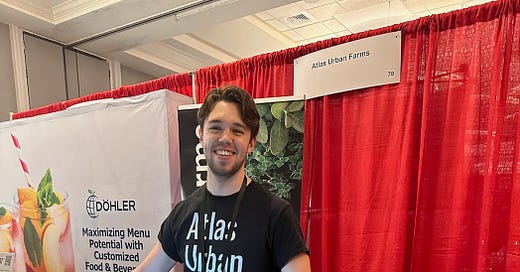Live from RCA Conference 2024
TL:DR - I attended the Research Chefs Association Conference last week. Here are my highlights
Last week, I had the opportunity to attend RCA Conference 2024. This was the annual gathering of the Research Chefs Association, the first full conference since before the pandemic. This was a great opportunity to meet a ton of interesting people, catch up on the latest trends in the food world, and sample some delicious food. It was a fairly small event at ~600 people, but I wanted to share my experience and spread the word about RCA and culinology.
What is a Research Chef?
I get this question all the time. Most people think of a chef as someone who works in a restaurant, but that’s not always the case. Most, if not all, food products you’ve ever had were created by a research chef, or a food scientist. These are people with culinary training who do the research and development work to bring new products to market. According to the website, “The Research Chefs Association is a diverse, collaborative, and engaged collection of professionals dedicated to elevating food product development.” I like the shorter description, “the minds that feed the world.” There’s a big emphasis on new technology, innovative practices, and getting your hands dirty that I think has a lot of overlap with the startup world (an area I’m more familiar with).
Field trip to Chew Innovation
The whole week kicked off with a pre-conference outing to Chew Innovation, located in Fenway. I’d heard of Chew before, and I know some of the team members there, but I had never had the chance to see their headquarters, or experience it alongside the chefs.
We were treated to a presentation about authenticity and recipe development. The food world is changing so rapidly, and consumers are demanding more innovation. The Chew team spoke about staying grounded while introducing new flavors, textures, and other features. They emphasized balancing between something consumers know, and adding in something new.
After that, we had the chance to implement what we had just learned. This was my favorite part of the whole conference. I got to play sous chef to the rest of my team, which was fun. It was amazing to see them create a recipe from scratch in just a few minutes. The three chefs on our team bounced ideas back and forth, working collaboratively and building on one another’s concepts. Beyond that, the process of creating the dish (which involved chopping vegetables, cooking a few items, and combining in different amounts) proved to be iterative as well. Even when the organizers called time, the culinary minds on my team were still tweaking the balance of acid and salt in our recipe. It was really cool to be part of this process, and get to taste all the delicious creations afterwards.
With a Little Kelp from my Friends
Among the speakers at the conference, my favorite was Briana Warner, CEO of Atlantic Sea Farms. She spoke about the challenges and opportunities of harvesting kelp in the Gulf of Maine. Given my work in the urban farming industry, I found this talk fascinating.
Atlantic Sea Farms has taken advantage of the unique setting of Maine to build a thriving kelp farming business. By partnering with lobster fishermen (and women), ASF has created a new crop that complements the existing seasonal lobster harvest. The kelp season is mainly in the spring, while peak lobster season lasts from mid-summer until December. Furthermore, the kelp collection builds on the existing infrastructure; ASF didn’t have to build any boats to harvest the crops, since the boats already existed for the lobster industry.
There were some challenges, though. The kelp industry is fairly young, and many people are unfamiliar with how kelp may integrate into existing cuisines and dishes. There are also challenges in expanding the kelp harvest, as it only grows in certain waters (like the cold Gulf of Maine, for example). Finally, climate change and fragile marine ecosystems threaten this potential source of food and prosperity for Maine coastal communities. The main takeaway was that kelp and the blue economy are spaces to watch in the future.
Overall the RCA Conference was a great event, and I had the chance to have lots of interesting conversations. We even had the opportunity to demo some new technology. I can’t wait for the next conference and the new innovations that are coming out of this community.



